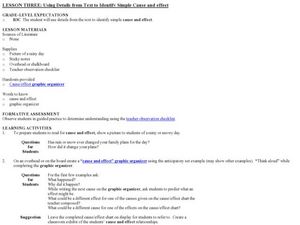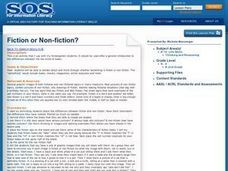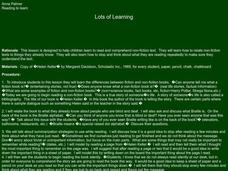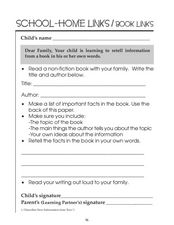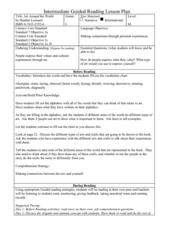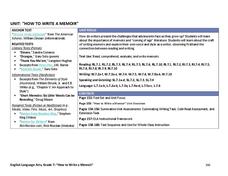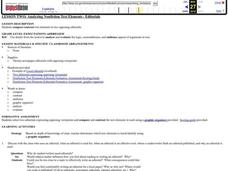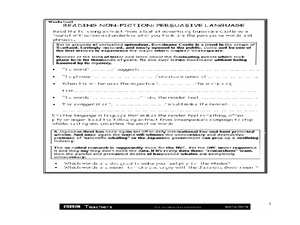Ontario
Reading Informational Text
Learning to recognize the importance of the features of information text (i.e., titles, subtitles, endnotes, sidebars, etc.) is the focus of a reading activity designed for middle schoolers. Learners examine how these text features help...
Curated OER
Lesson Three: Using Details from Text to Identify Simple Cause and Effect
Third graders identify cause and effect. For this cause and effect lesson, 3rd graders use a graphic organizer to predict effects for certain causes. They read a non-fiction text and put sticky notes marking causes and effects.
Curated OER
Literacy:Non-Fiction Stories
Third graders explore non-fiction stories. They follow along as the teacher reads a story. Students fill in words as the teacher reads to ensure they are following along. They discuss the text features found in the book and the features...
Curated OER
Discussing Non-Fiction Texts
Discuss non-fiction texts and fact and opinion. Learners discuss the features of non-fiction text, identify how to distinguish fact from opinion, and list ways to display information, including graphs, charts, and diagrams. While this is...
Curated OER
Fiction or Non-fiction
Third graders view three texts, A DAY IN THE LIFE OF A FOOTBALLER, THE HUMAN BODY, AND WHICH IS WHICH? with the titles covered. They discuss whether the books are non-fiction or fiction and try to come up with suitable titles for the books.
Curated OER
Using Details From The Text
Begin this expository writing activity by reading a non-fiction book of your choice and modeling expository writing. The plan suggests The Trip of a Drip by Vicki Cobb but notes that other texts will work. Learners then choose a...
Curated OER
Reading Comprehension- Informational Passages "Abraham Lincoln"
Who was Abraham Lincoln? Help your English language learners recognize Lincoln's impact on the United States. After reading a short passage, learners answer five reading comprehension questions and five vocabulary questions.
Learning Station
Scan It
In this reading strategies worksheet, students will learn how to scan for information. Then students will scan a non-fiction passage about weather and complete 4 short answer questions.
Curated OER
Reading to Learn
Children learn to read and comprehend non-fiction text and explore how to relate non-fiction texts to things they already know. They then examine how to stop and think about what they are reading repeatedly to make sure they understand...
Polk Bros Foundation
Preview Reading
Scanning a text before getting started is a reading strategy that your pupils can use to get a general idea about a text before diving in. Give some direction to their scanning with a worksheet that includes items to check for and space...
Scholastic
Dear Miss Breed
This compelling plan based on the letters in the book Dear Miss Breed engages readers in learning what it was like for Japanese Americans following the attacks at Pearl Harbor. After reading the letters, young scholars will partake in...
Curated OER
School-Home Links/Book Links: Non-Fiction
In this early childhood non-fiction comprehension worksheet, students read a non-fiction book with caregiver, list the important facts, and retell the book in their own words.
Curated OER
Historical Agency in History Book Sets (HBS)
Study historical events by combining the study of historical fiction and non-fiction. Learners read about true past events in historical fiction novels and then research non-fiction accounts of the same events. What are some differences...
Curated OER
Art Around the World
The non-fiction book Art Around the World by Heather Leonard serves as inspiration for learning how art reflects cultures and values. New vocabulary and background knowledge are fleshed out before reading the story. Afterward, the class...
PBS
Arthur’s World Neighborhood: Bibliography for Kids
Support young learners as they expand their cultural awareness with this list of children's literature on countries from around the globe. Including both fictional and non-fictional texts. This resource will help students across the...
Curated OER
Fast Food Nation: Study Questions
Are you introducing your class to the horrors of eating unhealthy? This lesson contains 24 reading comprehension questions relating to the non-fiction book. Readers are encouraged to copy these and answer them in their reading journals.
Curated OER
Non-Fiction Reading and Writing
In this non-fiction text worksheet, students read the passage about spring flowers. Students then underline the sentences about Daffodils and Primroses.
Mary Pope Osborne, Classroom Adventures Program
The Backpack Travel Journals
Strap on those backpacks, it's time to travel through history with this literature unit based on the first four books of The Magic Tree House series. While reading through these fun stories, children create story maps, record interesting...
Louisiana Department of Education
How to Write a Memoir
Who are we and what shapes our identities? Seventh graders work to answer this question as they learn how to write a memoir. Full of non-print resources and supplemental texts that range from fiction to non-fiction, scholars write their...
Curated OER
Reading Non-Fiction
Students identify the key features of printed non-fiction texts. In this deciphering texts lesson plan, students watch a video clip of a news program and a children's program to compare presentations. Students also identify...
Curated OER
Analyzing Nonfiction Text Elements - Editorials
Students examine the text features of non-fiction. In this literacy lesson, students read editorial samples provided by their instructor and analyze the texts for word choice, details, and organization.
Curated OER
Reading Non-Fiction: Persuasive Language
In this persuasive text learning exercise, students read an excerpt from an advertising leaflet and identify the persuasive words and phrases used in the text. Students then read the text about a Greenpeace campaign to identify emotive...
Curated OER
Reading with Bailey’s Book House
Students decode words as they construct meaning. For this writing lesson plan, students create a story using the software program Bailey's Book House. They listen to their story on the computer, print it out, and read it aloud.
Curated OER
Fictional Hereos
Students are introduced to the definition of a hero. As a class, they compare and contrast the difference between non-fictional and fictional hereos they have read about. They read a story, create a story map of one of the heroes and...



